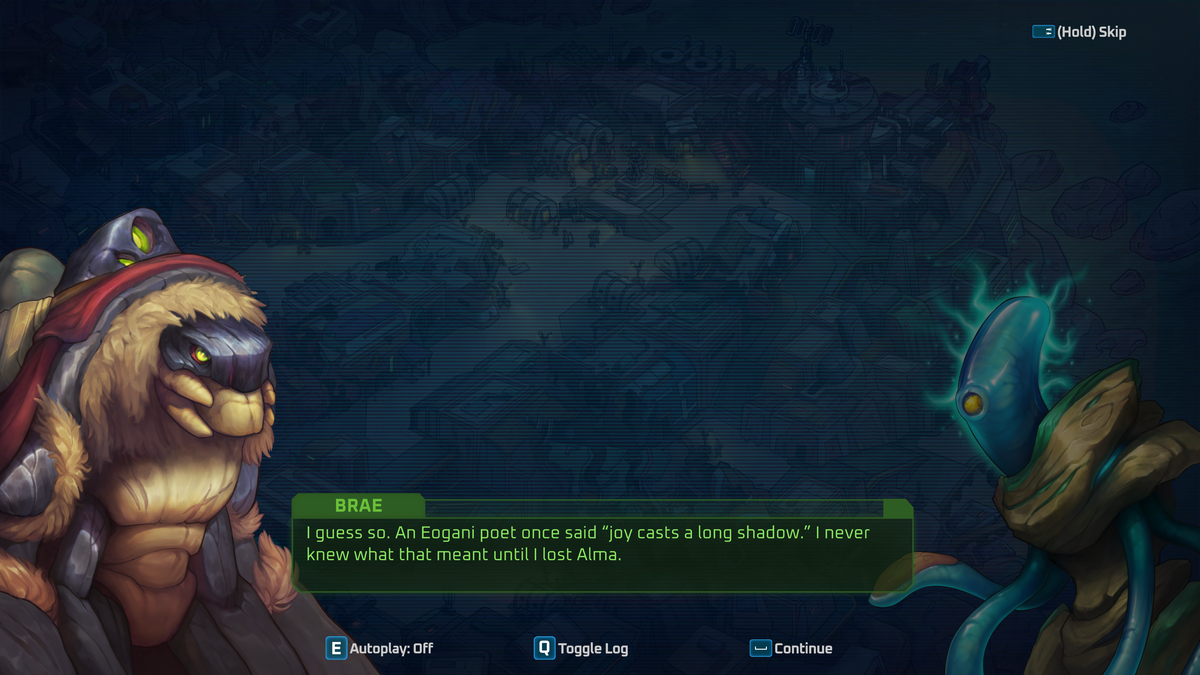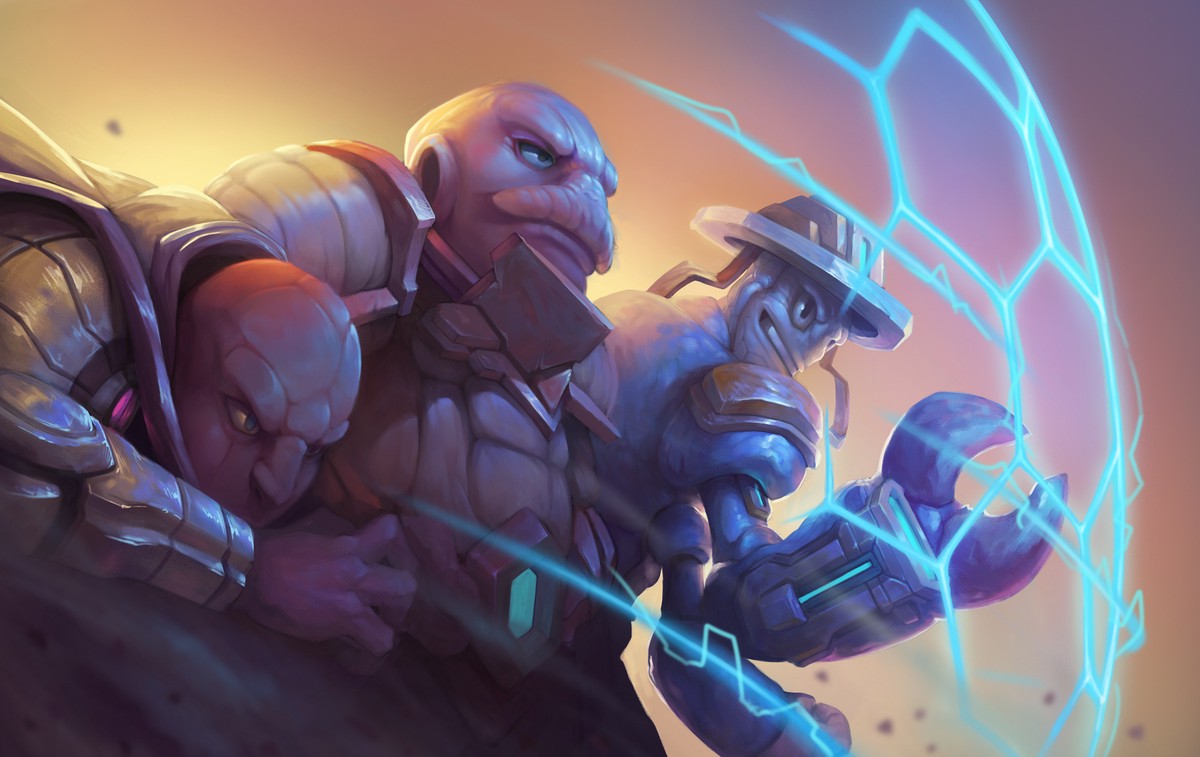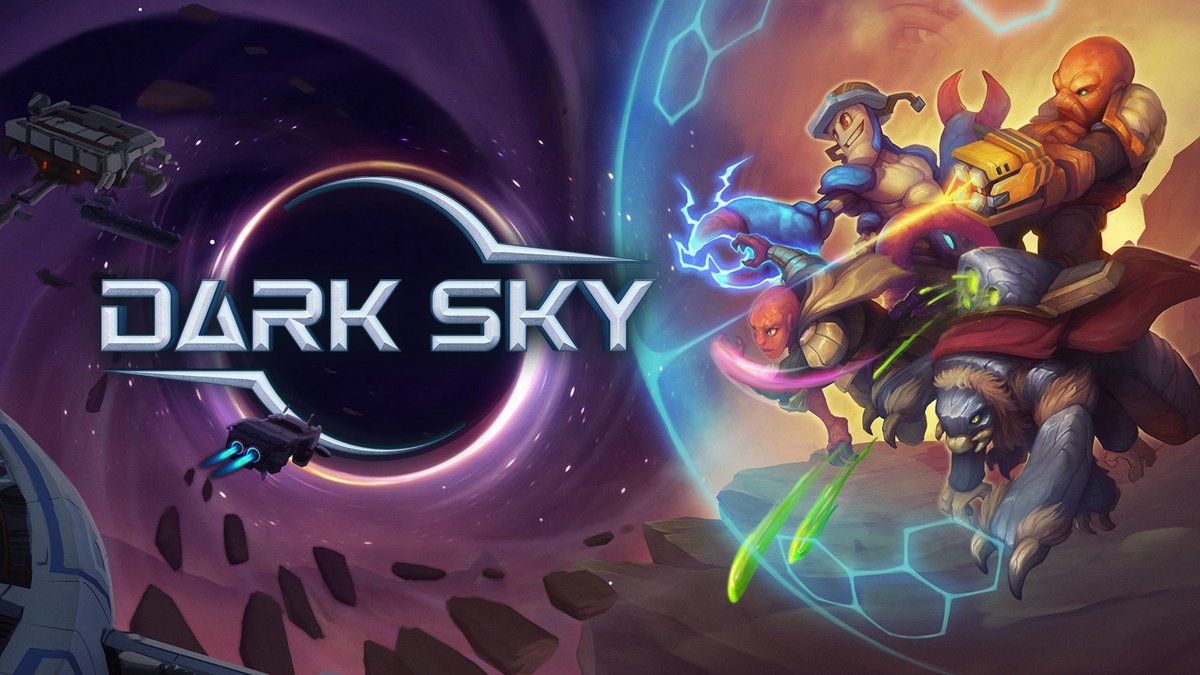A Space Deck Builder
Imagine this: a strategy/card game hybrid focused on you collecting a group of stragglers to uncover a conspiracy that affects not just the planet you're on but could rewrite history as you know it. This is the basis for Midwest Games' Dark Sky. Originally released in 2024, this game is full of the charm, strategy, and enjoyment that has the potential to attract more people to games like it. With an art style that evokes the feelings of a Saturday morning cartoon, it almost feels like the perfect gateway for younger audiences.
Story and Worldbuilding
Dark Sky begins with an immediate charm when we meet our first two characters, Norton and Squig. They are on the city Moros to complete a job when all of a sudden an attack hits. After you take out your first wave of enemies and reach the main plaza, you sign up to be part of a group that is tasked with getting to the bottom of the attack. Along the way you will pick up other playable companions like Agama, a serious and cold warrior who learns to accept and work with the rest of the team.
As the story unfolds, I found myself interested in the general conflict and the underlying themes about religion and the afterlife. Two of your companions end up having many discussions about our corporeal bodies and the identification of what makes someone a person. If you have the same memories but a different body, are you the same person? If you've heard about the "Ship of Theseus," then you are likely to follow these discussions a little bit easier. Even with that said, I do believe that a younger audience would truly benefit from grappling with the concepts presented in the game.

The world of Dark Sky truly feels like it has been lived in. Outside of just the lives of the main characters, there are key revelations that date back many years and have had a ripple effect on the current story. To steer clear of spoilers, I will just say that there is a caste system at play, and the more you learn about the levels and classifications of our characters, the stronger the motivations become for the main characters.
Combat and Systems
Combat uses a card-based system where your actions are determined based on your draw. Each turn you will draw a series of cards that are either character-specific or just item cards that you find along the way. These include actions to lace the field with poison, move an enemy to another space, or chain together lightning attacks as your character builds up power. Cards come with an energy cost that will be depleted from your pool of resources as you use them. If you're smart enough, you can make 5 energy feel like you took out a whole team. An example of this would be the character __, who has an ability that allows you to recall one of the top three cards in your discard pile and play it for free. If you sequence your actions properly, that card could be the saving grace in clearing out a whole field of enemies.
Outside of the card system, there is also the movement system. Each character has their own number of spaces they can move before dealing damage on the field. If you have already dealt damage, then you can no longer move unless you have certain cards that allow it. This becomes especially useful when using a system in the game that allows you to see what your opponents are going to do next turn. You simply hover over the enemy, and it will give a brief description of what they are planning to do next turn. Sometimes they are simply going to shield up, whereas other times they are going to throw a grenade that deals damage in a specific pattern. By looking at their move set, you begin to intentionally place your characters in areas that will keep them alive.
Outside of combat, you can level your character's cards so that they become more effective. Each card will have two basic options and two advanced options to choose from. These upgrades affect aspects of your cards like range, status effects, discard effects, or even the ability to trigger the card a second time. Because each character is so different, you can really design your squads in specific ways based on the battles. Paired with the loadout system, the game offers you a great foundation to build and expand your chosen playstyles.
It is a great foundation, but by the end of the game I was sick of engaging in combat. The pacing truly began to feel off as every 20-30 seconds, outside of dialogue, I was running into groups of enemies to engage in another battle that could last for longer than I frankly had patience for. Nothing felt worse than doing three back-to-back fights to reach the final boss, only to have to do another two fights before I could fight the boss, and then having to fight the boss twice, losing access to one of my core players, and then finally finishing the game.
Art Style and Performance
Outside of the mechanics, the strongest element is the art style. While it's not a controversial thing to say that a compelling art style brings audiences in, I feel like a strong identity is what gets people to stay. The art of Dark Sky, done by Chris Gardula, has both aspects. Characters and enemies are distinct, so when you look at the battlefield, you know exactly who can do what. In dialogue and supplemental images, characters have a warmth to them that makes me want to see them expand into comics or other mediums to continue the stories of this world.

Art from Chris Gardula's ArtStation page
The game ran well on my computer and has controller support. I tried it on my desktop, which has an RTX 2070 Super, 16 gigs of RAM, and an AMD Ryzen 5 3600 that ran it with no issues. I also tried it on my laptop, which has an RTX 4070, a 13th Gen Intel(R) Core(TM) i7-13700HX, 16 gigs of RAM, and it ran perfectly fine as well. With the art style presented, it should run fine on many configurations.
Final Thoughts
Dark Sky was a fun time that I found myself full of by the end. I ultimately felt that this game would be great for younger audiences but would need some work to keep teenagers and older audiences engaged completely. With strong visuals and a good foundation, there is fun to be had throughout. Hopefully Ganymede can continue to iterate on the formula presented here with a future game that plays to their strengths and polishes other areas.
Dark Sky is available to purchase on Steam for $20.
Disclosure: We received a free review copy of this product.


